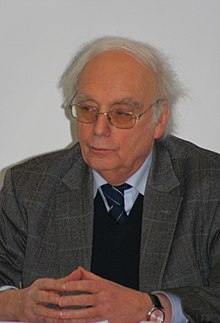Historical commission at the SPD party executive
The historical commission of the SPD party executive (HiKo) acted between 1982 and 2018 as a historical-political and tradition- preserving body of the SPD party executive.
history
The proposal to set up a historical commission in the SPD party executive was accepted by the SPD's executive director at the time, Peter Glotz , in October 1981, under the leadership of party chairman Willy Brandt . In 1982 the commission appointed by the party executive met for the first time. Susanne Miller became the first chairman of the historical commission . Peter Glotz's original intention was to strengthen the social democratic identity in a difficult phase for the SPD. In the course of the discussion about the NATO double decision , cuts in social benefits and the difficulties with the coalition partner at the time, the federal party wore itself out in wing battles. With a return to its own tradition , which was already over 100 years old at the time, the party's sense of identity should be strengthened again.
At the end of July 2018, the SPD executive board announced that the work of the historical commission and other discussion forums would be discontinued for cost reasons. Historians with different political preferences criticized this plan. In February 2019 the party executive convened the SPD history forum, which has been advising the party on historical issues ever since. In addition to historians, the roughly 30-strong body also includes several SPD members of the Bundestag. In June 2019 Kristina Meyer and Bernd Rother were elected as equal speakers of the SPD history forum.
Tasks and objectives
In addition to safeguarding the social democratic tradition, the Historical Commission acted as an active advisor to the SPD party executive and other social democratic bodies on issues of history and memory politics. Every year the Historical Commission organized scientific forums on various (contemporary) historical topics. The focus was on the historical dimension of current political issues. In addition, she organized workshops for young historians who deal with aspects of social democratic history. The Commission also contributed to current political debates through statements.
Selection of forums of the Historical Commission
- 2003 “Expulsions in the 20th Century. Happening and visualization "
- 2004 “Welfare State in Europe. History and future of a successful model "
- 2005 “Germany, Europe and German catastrophe. Common and opposing learning processes "
- 2007 “The social democratic project in transition - On the question of the identity of the SPD”.
- 2009 "The European Idea of Freedom - On the Historical and Present Significance of 1989"
organization structure
The members of the historical commission were appointed by the party executive of the SPD. The highest decision-making body was the annual meeting that meets every year. Between the annual meetings, the Working Committee of the Historical Commission acted as the executive body. Attached to the historical commission was the secretariat of the historical commission in the SPD party headquarters, which is headed by the secretary of the commission. From 1989 to 2018, Bernd Faulenbach , Ruhr University Bochum , was chairman of the historical commission of the SPD party executive. According to the structure of the party, there are also regional historical commissions of the SPD at the state, district and municipal level (including the historical commission of the Berlin SPD or the party in North Rhine-Westphalia ) that continue to exist. The Historical Commission of the SPD Brandenburg was newly founded in August 2019.
Web links
- Historical commission of the SPD
- Historical commission of the SPD Berlin
- Historical commission of the SPD sub-district Offenbach-Stadt
- Historical Commission SPD Dresden
- Historical Commission SPD Hamburg / AvS
- Historical Commission SPD Baden-Württemberg
- History workshop in the SPD Schleswig-Holstein
- Historical commission of the SPD Brandenburg [2]
literature
- Faulenbach, Bernd / Adler, Gunther (ed.): Europe, Germany and the "German catastrophe". Common and opposing learning processes , Essen, Klartext Verlag, 2007.
- Faulenbach, Bernd / Adler, Gunther (Ed.): Social state in Europe. History and future of a successful model , Essen, Klartext Verlag, 2006.
- Faulenbach, Bernd / Helle, Andreas (Ed.): Forced Migration in Europe. On the scientific and political debate about the expulsion of Germans from the East , Essen, Klartext Verlag, 2005.
- Faulenbach, Bernd / Eckert, Rainer (Ed.): On the way to civil society? Myth and Reality of the 60s and 70s East and West , Essen, Klartext Verlag, 2003.
- Faulenbach, Bernd / Potthoff, Heinrich (eds.): The German Social Democracy and the Revolution 1989/1990 , Essen, Klartext Verlag, 2000.
- Faulenbach, Bernd / Stadelmaier, Martin (Ed.): Dictatorship and Emancipation. On Russian and German developments 1917–1991 , Essen, Klartext Verlag, 1993.
- Faulenbach, Bernd / Timmermann, Heinz (Ed.): Nationalism and Democracy. Social modernization and national idea in Central and Eastern Europe , Essen, Klartext Verlag, 1993.
Individual evidence
- ^ Mike Szymanski: Austerity measure. Das Ende der Geschichte , Süddeutsche Zeitung (online) July 24, 2018. Accessed July 25, 2018.
- ^ Edgar Wolfrum : The historical dementia of the SPD . In: Die Tageszeitung , July 24, 2018, accessed on July 25, 2018.
- ↑ Paul Ingendaay : The SPD's memory is to be abolished . In: Frankfurter Allgemeine Zeitung (online), August 6, 2018, accessed on August 6, 2018.
- ↑ [1]
- ↑ Andrea Nahles (Ed.) "Yearbook 2011–2012 of the Social Democratic Party of Germany" 2013, page 91

